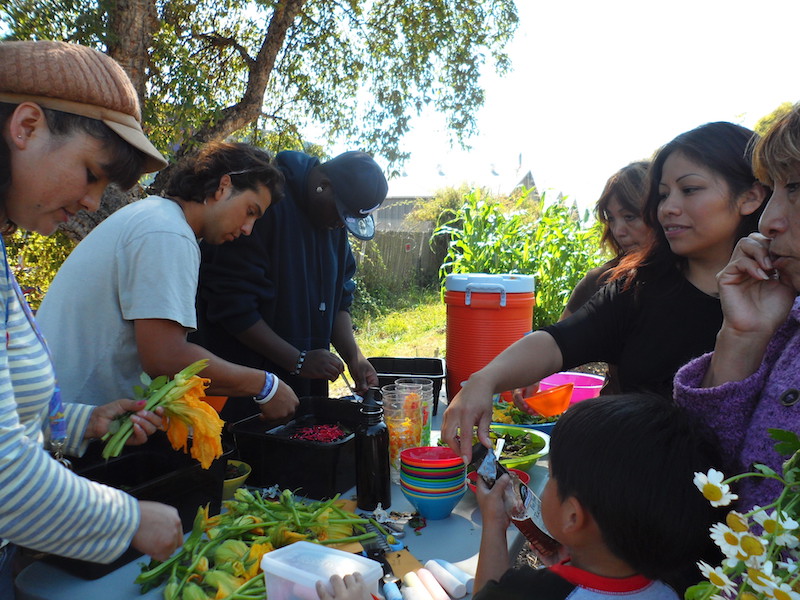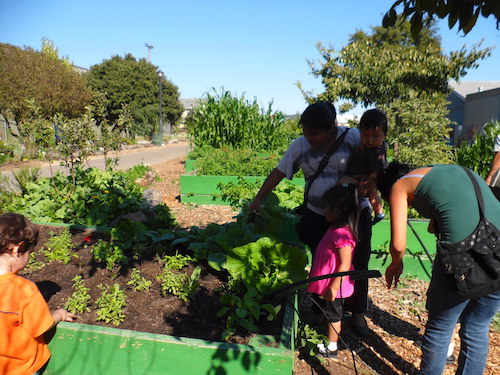
03 Dec Food From the Source at the Richmond Greenway
Food Review, The CC Pulse
The best way to get fresh and nutritious food is to get it straight from the source: Right out of the ground it was grown in. Luckily for residents of Richmond, the 6th Street community gardens are free and open to everyone.
Anyone can come and volunteer their time, or they can just come and harvest whatever is ripe and ready for the picking. There is no cost for the food and no obligation to volunteer, although help is always appreciated.
While you’re there, you might run into The CC Pulse contributor and Brower Youth Award winner Tania Pulido, who manages the gardens.
 “People harvest all the time and they tell us stories about the stuff they cooked, or they give us (cooking) suggestions,” said Pulido. “I’ve met people who have made it kind of their ritual to go harvest, and then go about their day. All types of people, too: Not just children or mothers but high school students, people you wouldn’t really picture harvesting from a garden. But it’s there and they definitely do it.”
“People harvest all the time and they tell us stories about the stuff they cooked, or they give us (cooking) suggestions,” said Pulido. “I’ve met people who have made it kind of their ritual to go harvest, and then go about their day. All types of people, too: Not just children or mothers but high school students, people you wouldn’t really picture harvesting from a garden. But it’s there and they definitely do it.”
The gardens were started about four years ago by community activists Park Guthrie, Paula Kristovich, Cassie Scott and Doria Robinson, as a way to offer Richmond residents a chance to experience planting, harvesting and eating their own freshly grown produce.
“[The founders of the garden] thought [the Greenway] would be an ideal place for a garden, because people use it as a walkway and bike path. People also use it to get to their house or they use it to get their kids to school. So it was a very ideal place for them to create a garden, and they started really small – just Richmond residents, coming together. Then they started growing and expanding more.”
There are a number of distinct community gardens on the Greenway.
“One of them is Lincoln School Farm and the other is Berryland,” explained Pulido. “Lincoln Farm has about 40 raised beds and we have vegetables growing in them. Right now we have winter crops growing in them, such as broccoli, carrots, purple tree collards, lettuce and fava beans. We grow all year round at Lincoln Farm.”
If you like fruit, then the other garden offers a wide variety of berries.
“At Berryland we have about 18 different types of berries,” continued Pulido. “They range from gooseberries to mulberries to the more popular ones such as raspberries and strawberries.”

Just don’t expect to taste any of those berries during the winter, said Pulido, because the berries are dormant during the colder months of the year. But the Berryland farm does grow snow peas during the winter months – last year they were a “big hit” with residents – and there is also a fig tree, 5 pineapple guavas, and an assortment of fresh herbs.
Pulido, an emerging leader in Richmond’s urban farming and local food scene, has slowly assumed more responsibility for the gardens.
“Two years ago I started maintaining Berry Land. Recently we joined our gardens together, so now they’re under one big umbrella and this year I’ve been managing both,” she said.
“The gardens are open to the public 24/7. If people want to come and volunteer, that’s great. If people want to plant, that’s awesome but we don’t require it. What makes the gardens really unique and special is that they don’t have any gates. This comes with its pros and its cons, but overall we think it’s worth not having a gate so people can walk into the garden whenever they want. They’re not limited or regulated by anyone.”
For more information about how to access food or be a volunteer, you can visit the Urban Tilth website at http://www.urbantilth.org/gardens/ OR call 510-778-5886.






No Comments